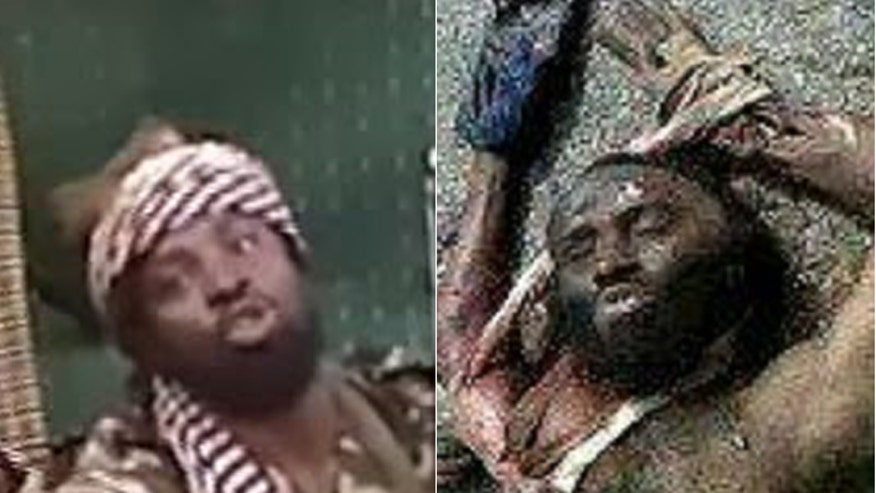Results 1 to 1 of 1
Thread Information
Users Browsing this Thread
There are currently 1 users browsing this thread. (0 members and 1 guests)
-
09-22-2014, 06:24 PM #1
Photo prompts speculation Nigeria's Boko Haram leader killed in battle
Photo prompts speculation Nigeria's Boko Haram leader killed in battle
Published September 22, 2014 FoxNews.com
 At right, a photo released by officials in Cameroon purports to show Boko Haram leader Abubakar Shekau, (l.), dead.
At right, a photo released by officials in Cameroon purports to show Boko Haram leader Abubakar Shekau, (l.), dead.
A grainy and gruesome photo has fueled speculation that the infamous leader of the Nigerian terror group Boko Haram is dead, even as the African nation's army presses fighters in the northern territory and the fate of hundreds of hostages hangs in the balance.
The military in neighboring Cameroon claims to have killed Abubakar Shekau, the warlord seen earlier this year in a monstrous video vowing to sell nearly 300 kidnapped schoolgirls, and even released a photo purportedly of his corpse. Nigerian security forces are trying to authenticate the report, and officials in the U.S., which has aided Nigeria's hunt for Shekau, declined to comment when asked by Fox News if they are checking into the validity of the image.
"We are aware of the reports, but can’t confirm anything at this time," a U.S. State department official said.
There is no question that the man shown in the photo released by Cameroon bears a strong resemblance to Shekau, but the terror leader reportedly uses body doubles to confound his enemies. The recent report is not the first time that Shekau was claimed to have been killed, although the statement from Cameroon, which has been battling Boko Haram at the border, and the photo, make this instance more compelling than others.
Cameroon officials say Shekau was killed in battle near the northeastern city of Konduga. According to Bloomberg.com, the Nigerian Armed Forces tweeted out a posting claiming that more than 60 Boko Haram militants were killed in the battle and that a senior leader had been captured.
Military officials in the region had claimed last year that Shekau was killed in a battle on June 30. He later appeared in a video sent to media outlets to prove that he was still alive.
Boko Haram, which claims to have established a caliphate in the town of Gwoa, and according to Human Rights Watch, has killed more than 2,000 innocent people in the first half of 2014. But the group gained international infamy when it abducted nearly 300 schoolgirls from the northern town of Chibok in April. Although dozens are believed to have escaped, 200 or more remain captive in the rugged wilds of northern Nigeria.
Nigerian officials, along with the international committee of the Red Cross, have been involved in talks with Boko Haram in an effort to negotiate the release of the school girls. According to reports, the officials met numerous times with senior-level Boko Haram members in the Nigerian capital of Abuja. The possibility of a swap was discussed in which 30 Boko Haram commanders in Nigerian custody, including Kabiru Sokoto, a senior member of Boko Haram who was convicted last December of a fatal church bombing on Christmas Day in 2011 in the town of Madallah, would be released in exchange for the school girls.
However, the talks appeared to stall after the Boko Haram members suggested an even swap which the Nigerian government refused, demanding that all the remaining girls held captive be released. The members said they would bring the offer to Shekau's inner circle.
Boko Haram was founded in in 2002 in Nigeria's Borno State, where it campaigned, mostly peacefully, for a Shariah state. But in 2009, after founder Mohammed Yusef was executed in Nigeria, Boko Haram took a violent turn, embracing terrorism, forcing conversions of Christians, and orchestrating kidnappings and bombings. In recent years, Boko Haram has emerged as one of the world's most dangerous and violent Islamic terrorist sects.
The Obama administration has pledged to help the Nigerian government attempt to rescue the girls, and has assembled a team of military and law enforcement agents to provide logistical support in tracking the group. Noko Haram is believed to be in Nigeria's northeastern Borno State, hiding in the vast Sambisa Forest in northeastern Nigeria. Experts have said the kidnapped girls could serve as human shields, preventing the Nigerian military from bombing the rugged and impenetrable wilderness, as well as becoming the child brides of Shekau's fighters.
http://www.foxnews.com/world/2014/09...led-in-battle/
NO AMNESTY
Don't reward the criminal actions of millions of illegal aliens by giving them citizenship.
Sign in and post comments here.
Please support our fight against illegal immigration by joining ALIPAC's email alerts here https://eepurl.com/cktGTn
Similar Threads
-
Nigeria Military Launches ‘Operation’ Against Boko Haram
By JohnDoe2 in forum Other Topics News and IssuesReplies: 0Last Post: 08-25-2014, 05:41 PM -
Nigeria - Boko Haram slaughtering Christians
By AirborneSapper7 in forum Other Topics News and IssuesReplies: 0Last Post: 06-12-2014, 11:39 AM -
Flashback: Obama Admin Threatened Sanctions Against Nigeria For Fighting Boko Haram
By AirborneSapper7 in forum General DiscussionReplies: 1Last Post: 05-16-2014, 11:13 AM -
REPORT: US IGNORED NIGERIA'S 2013 REQUEST FOR AID TO COMBAT BOKO HARAM
By Newmexican in forum Other Topics News and IssuesReplies: 0Last Post: 05-11-2014, 09:07 AM -
Boko Haram Muslim Terrorists In Nigeria Tie Up 15 Christians, Including Children,
By Newmexican in forum Other Topics News and IssuesReplies: 0Last Post: 01-06-2013, 12:11 PM


 LinkBack URL
LinkBack URL About LinkBacks
About LinkBacks




 Reply With Quote
Reply With Quote


First List to Move to Archive "Non-Citizen & Illegal Migrant...
04-17-2024, 06:55 PM in Non-Citizen & illegal migrant voters